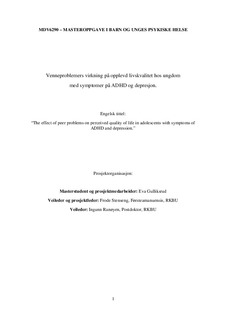| dc.description.abstract | In a clinical sample of Norwegian adolescents, we examined whether there was a correlation between perceived quality of life and peer problems, whether perceived quality of life was differently related to symptoms of ADHD and emotional symptoms, and whether there were differences between girls and boys. Finally, we tested to which extent peer problems enhanced or reduced the correlation between symptoms of ADHD and emotional symptoms with quality of life, in other words whether peer problems was a mediator.
We used data from ”Helseundersøkelsen i Barne- og ungdomspsykiatrisk klinikk (Hel-BUP)” which is a cross-sectional study among all adolescent patients aged 13-18 years at the BUPKlinikk, St. Olav's Hospital (data collection conducted between 2009-2011). The youth answered online questionnaires about their health, and journal data with diagnoses and results of clinical procedures were collected.
We found that emotional symptoms to a greater extent were related to peer problems compared to ADHD symptoms, and that emotional symptoms were more strongly related to poor quality of life than ADHD symptoms. Results showed that adolescents with emotional problems had low quality of life, and we found girls to have lower quality of life than boys. We also found that peer problems may increase the effects of emotional symptoms on poor quality of life. | nb_NO |
